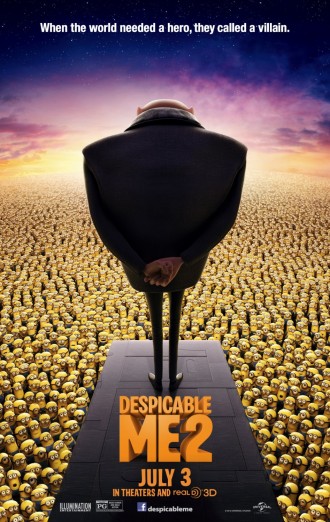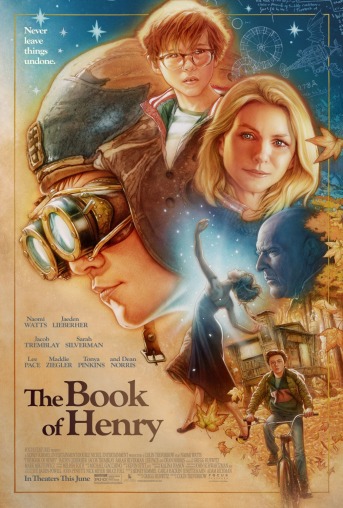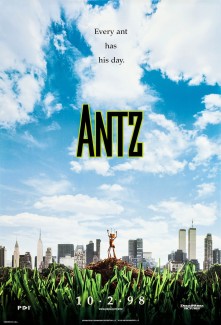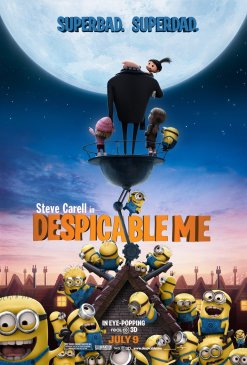 I kept thinking during “The Book of Henry” about how the film seemed to not understand how people work. More importantly, it felt like it didn’t know how children behave, particularly at different ages. The movie used the broad brush of having all of the children either precocious or cute in an age inappropriate way.
I kept thinking during “The Book of Henry” about how the film seemed to not understand how people work. More importantly, it felt like it didn’t know how children behave, particularly at different ages. The movie used the broad brush of having all of the children either precocious or cute in an age inappropriate way.
Then we have “Despicable Me 2,” which is a cartoon that, despite one flaw, manages to understand how people, particularly children, behave on a day-to-day basis better than “The Book of Henry” or quite a few other scripted TV shows and movies.
“Despicable Me 2” is an interesting film to write about because it feels like it’s the result of a pleasant surprise, similar to “Toy Story 2.” It’s likely Illumination Animation would have gone on to continue to release more films, especially when you look at how they already had “Hop” scheduled for release the next year. But “Despicable Me” managed to be a massive hit, probably bigger than anyone could have expected. Yes, that does mean some people have pre-judged the series, but it has spawned what, based on the second movie, are pretty enjoyable films to help escape the current world.
Gru (Steve Carrell) has retired from villainy to become a full-time father. After a research station is stolen by a giant magnet, he is recruited by the Anti-Villain League to find who stole an experimental serum. While undercover in a bakeshop with AVL agent Lucy Wilde (Kristen Wiig), Gru begins to suspect Eduardo (Benjamin Bratt), the owner of a Mexican restaurant, is the presumed dead villain El Macho and behind the theft. Meanwhile, the Minions begin going missing from Gru’s home and lair.
The “Despicable Me” movies fall back on some of the tired, annoying problems common in animated films, such as fart jokes, butt jokes, and pop culture gags that sometimes seem out of place. In the universe of “Despicable Me,” there isn’t nearly as much of a problem as in other films. In this film, there seems to be more than in the previous film–one character is named “Ramsbottom,” but I laughed–but it prevents the film from being too bogged down. No, I’m not sure I needed the Minions to make me wonder why none of the members of The Village People ever donned drag and went as the Chiquita lady, but the movie still works.
This is largely because “Despicable Me” often feels like what would happen if you made a Bond film without James Bond that was told from the perspective of the villains. Steal the moon? Steal the Great Pyramid? Steal the Times Square jumbotron? These are all things that have not only happened, but are completely plausible in the universe of the film. The area where the second movie trips up is with the villain. The motivations for the villains in the universe of these films is often, “Why not?” or a means of getting their names out there. But here we’re given a villain whose motivations often feel incredibly murky. Why this? Why now? Yes, we get a nice “Hoboken” gag out of it, but it feels underdeveloped.
The two other problems with the film stem from it losing its bite from the first film. It might be a problem with it becoming such a beloved film–it will be interesting to rewatch the “Shrek” films–but it also has the issue of Gru retiring from villainy. At heart, he’s still a bad guy, but he’s a bad guy with a heart of gold. He still never leaves home without his freeze ray and his knowledge of villains ends up saving the day in this movie. But without his plotting, the film feels like it lacks something.
The other key problem is the Minions, which is no doubt the result of them becoming such popular characters. While they do have a role in the plot of this film, they seem to spend more time on screen than in the first movie, which just feels unnecessary. They at least get their own movie, which will be interesting to watch, and it should be interesting to see how the third movie handles them as characters.
But at the end of the day, “Despicable Me 2” manages to be a fun, escapist comedy. This feels incredibly strange since it is an animated film with a certain fine balance of realism and playful absurdity. Even minor things like a joke at one point about how Agnes is reciting something for an assembly manages to be hilarious because of how true to life it is. It manages to be a family movie that isn’t stupid, which feels like it’s becoming increasingly difficult to make. It still is clever, with plenty of relatable moments and delightful sight gags. Even as an adult, after having my brain fried, albeit on my own terms, this was the right thing to watch and feel better.
There is a place for animated movies that aren’t the high art of Pixar films and are just enjoyable family entertainments. That might be what Illumination’s place in cinema is and there’s nothing wrong with that, especially since the studio seems to be good at doing that based on the “Despicable Me” movies and “Sing.”
 It’s rare that movies in this series result in me actually saying, “I can’t believe I just watched that.” “Divergent” certainly made me say that, as did the end credits of “Catch Hell.” But as I was walking to my car after seeing “The Book of Henry,” I actually said, “I can’t believe I just watched that.”
It’s rare that movies in this series result in me actually saying, “I can’t believe I just watched that.” “Divergent” certainly made me say that, as did the end credits of “Catch Hell.” But as I was walking to my car after seeing “The Book of Henry,” I actually said, “I can’t believe I just watched that.” Dreamworks must be one of the most successful companies to be the result of a feud.
Dreamworks must be one of the most successful companies to be the result of a feud. Despite having a very clear affection for most animated movies, I failed to see “Despicable Me” until recently. I actually don’t remember it being released in 2010, possibly because I was busy working on moving back to Chicago and trying to emotionally recover from “Toy Story 3.”
Despite having a very clear affection for most animated movies, I failed to see “Despicable Me” until recently. I actually don’t remember it being released in 2010, possibly because I was busy working on moving back to Chicago and trying to emotionally recover from “Toy Story 3.”